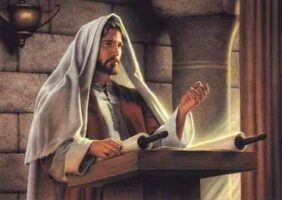Ha’azinu from a Messianic Perspective

Deuteronomy 32:1-52
Ha’azinu, one of the most beautifully crafted poems in the Torah, serves as a final song by Moses. This portion serves as a farewell and a vivid portrait of Israel’s journey and its covenant with God. Ha’azinu is structured as a song, blending prophecy with counsel. It’s a powerful call to remember Israel’s past, consider the consequences of forsaking God, and embrace the promise of redemption.
The song of Ha’azinu is split into sections, covering themes like divine retribution, mercy, and restoration. Moses uses this format to remind Israel of its unique relationship with God — a relationship built on promises. His words carry a deep emotional tone, warning against disobedience yet offering hope through repentance. Each verse weaves together reminders of God’s provision, humans’ failings, and the hope for renewal.
The significance of Ha’azinu lies in its role as a covenant reminder. It’s here that Moses reaffirms God’s unwavering commitment to Israel despite their failure to uphold His statutes. This poignant recitation reflects a deeper spiritual truth that transcends time. As readers, we’re invited to ponder over the cyclical nature of sin and redemption and how this profound song still impacts our spiritual lives today.
Messianic Insights: Finding Messiah Yeshua in Ha’azinu
Ha’azinu is filled with imagery and prophetic undertones that echo the New Testament writings about Yeshua. The song’s vivid depiction of God as a Rock stands out as a foundational symbol. Just as Ha’azinu praises God as the steadfast Rock, Yeshua spoke of building on the rock, emphasizing stability and faithfulness in one’s spiritual life. It’s a compelling metaphor that bridges the messages of the Old and New Testaments.
So, everyone who hears these words of mine and acts on them will be like a sensible man who built his house on bedrock. The rain fell, the rivers flooded, the winds blew and beat against that house, but it didn’t collapse, because its foundation was on rock.
(Matthew 7:24-25 CJB)
The prophetic elements in Ha’azinu point towards a future messianic hope, which aligns beautifully with Yeshua’s role as the promised Messiah. This portion speaks of redemption and divine compassion despite human failure, resonating with the core of Yeshua’s mission. In his teachings, Yeshua often referenced these themes, showing himself as the fulfillment of those ancient promises.
“What’s your opinion? What will somebody do who has a hundred sheep, and one of them wanders away? Won’t he leave the ninety-nine on the hillsides and go off to find the stray? And if he happens to find it? Yes! I tell you he is happier over it than over the ninety-nine that never strayed! Thus your Father in heaven does not want even one of these little ones to be lost.
(Matthew 18:12-14 CJB)
Yeshua’s life and teachings bring Ha’azinu’s messages into sharper focus. Yeshua spoke extensively about faith, repentance, and redemption, mirroring the themes Moses elevated in his song. For instance, Yeshua’s parable of the lost sheep underscores the relentless pursuit of redemption, echoing Ha’azinu’s themes of divine mercy.
To find Yeshua in Ha’azinu is to see the continuity of God’s promise throughout the Scriptures. The parallels offer a rich understanding of how Yeshua embodies these promises and calls us to live in light of God’s faithfulness. For those who follow Yeshua, this portion offers a profound depth to understanding his role in God’s redemptive plan.
Living the Message: Life Applications for Followers of Yeshua
Finding practical applications in the rich tapestry of Ha’azinu can guide us in living out our faith daily. The themes of obedience, repentance, and faithfulness are as relevant now as in Moses’ time. They call for introspection and a renewal of commitment to the values Yeshua embodied.
Yeshua’s teachings and actions mirrored the call to obedience found in Ha’azinu, urging his followers to live lives marked by love, humility, and service. Reflecting on how he washed his disciples’ feet or welcomed outsiders, it becomes clear how followers can enact these principles today through community service and acts of kindness.
Repentance plays a central role in both Ha’azinu and Yeshua’s messages. It’s about turning back to God, reshaping one’s path to align with divine will. Yeshua’s offer of forgiveness invites believers to continually seek reconciliation with God, demonstrating grace in personal relationships and communities.
Living according to these principles also means embracing justice and mercy. Followers of Yeshua are called to be peacemakers, forgiving transgressions, and working towards equity, mirroring the compassion shown in Ha’azinu. Applying these lessons leads to a life that reflects the heart of Ha’azinu’s message of covenantal fidelity.
Dale Solberg is a guest writer at Messianic Torah Portion offering a commentary and devotional thoughts from a Messianic Perspective on each week’s Torah reading. His views and opinions do not necessarily reflect those of The Messianic Light. You can reach Dale at dale@messianictorahportion.com.
Unless otherwise noted, Scripture quotations are taken from the Complete Jewish Bible, Copyright © 1998 and 2016 by David H. Stern. Used by permission. All copyrights reserved worldwide.
This post contains affiliate links. Purchases help support Messianic Torah Portion and do not affect the price you pay. Please do not make purchases on the Sabbath.
Messianic Torah Portion is a ministry of The Messianic Light.

Comments
Ha’azinu from a Messianic Perspective — No Comments
HTML tags allowed in your comment: <a href="" title=""> <abbr title=""> <acronym title=""> <b> <blockquote cite=""> <cite> <code> <del datetime=""> <em> <i> <q cite=""> <s> <strike> <strong>